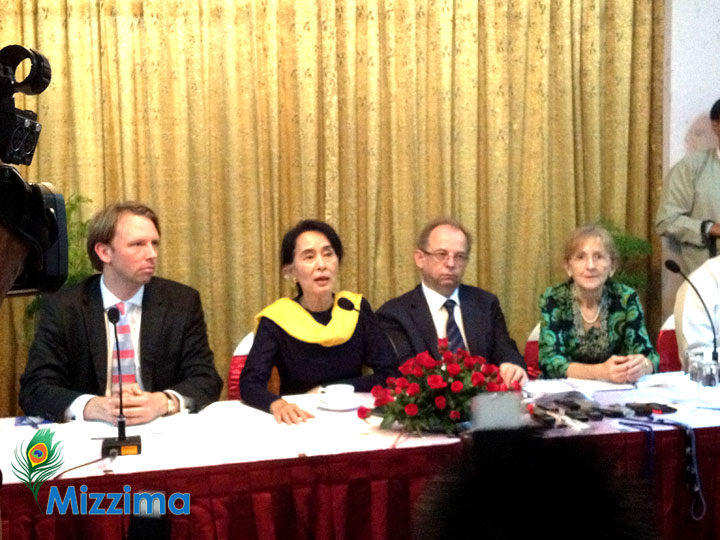Aung San Suu Kyi called for major amendments to be made to Myanmar's 2008 Constitution on Friday, saying that "the whole process is the most difficult in the world". The comments came at a press conference following a three-day workshop on Myanmar's constitutional reform organized by The Sydney Law School at Yangon's Mi Casa Hotel.
 Aung San Suu Kyi with Andrew McLeod, adjunct lecturer at the Sydney School of Law, Wojciech Sadurski, Challis Professor in Jurisprudence at the University of Sydney, and Janelle Saffin, an Australian MP, at a press conference following a three-day workshop on Myanmar's constitutional reform organized by The Sydney Law School at Yangon's Mi Casa Hotel, on Friday, May 10, 2013. (Photo: Mizzima)
Aung San Suu Kyi with Andrew McLeod, adjunct lecturer at the Sydney School of Law, Wojciech Sadurski, Challis Professor in Jurisprudence at the University of Sydney, and Janelle Saffin, an Australian MP, at a press conference following a three-day workshop on Myanmar's constitutional reform organized by The Sydney Law School at Yangon's Mi Casa Hotel, on Friday, May 10, 2013. (Photo: Mizzima)
A cross section of society attended the workshop, including Suu Kyi, current and former members of the military, leaders of the Union Solidarity and Development Party and representatives from most of Myanmar's ethnic groups, as well as international jurisprudence experts.
A range of views on the future of the military and the nature of federalism in Myanmar were raised at the workshop. However, there was a general agreement that the current constitution has inconsistencies that prevent Myanmar's transition to becoming a prosperous and stable member of the global community.
"The 75 percent required to change the constitution is unusually and absurdly rigorous and unprecedented in the world's constitutions today. It was clearly introduced for specific political reasons," said Wojciech Sadurski, Challis Professor in Jurisprudence at the University of Sydney. "If there is an area of consensus emerging from this conference, it's that the amendment that is needed are the rules of the amendment."
The current constitution requires a quarter of MPs to be from the military and gives the executive branch of government excessive control over the political system and the judiciary. It also forbids Suu Kyi being elected as president.
"It's not about blame, it's to solve the problem," said Suu Kyi, who highlighted her three priorities in Myanmar's transition to democracy: upholding of rule of law, protection of ethnic minorities and the amendment of the constitution.
In a speech to the nation on Sunday, President Thein Sein that the democratization of the nation was only two years old, and that reform processes were undertaken in the country through methods of trial and error while the society was not familiar with democratic practices.
In March, Myanmar's parliament approved the formation of a committee to review the 2008 Constitution.
"The principle objective [of the event] was to provide the constitutional tools needed for a transition to democracy and to assist Myanmar in moving towards an enduring democracy," said Andrew McLeod, adjunct lecturer at the Sydney School of Law and one of the event organizers. "Resolving this issue and providing a more effective form of federalism is critical to solving the ethnic tensions that have characterized recent history."
The Sydney Law School anticipates to hold similar workshops over the next year.


